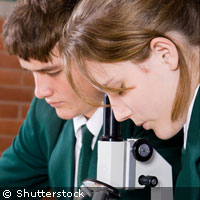Europeans making school science exciting
Reporting in the journal Science, researchers from the European Learning Laboratory for the Life Sciences (ELLS) at the European Molecular Biology Laboratory (EMBL) describe the challenges facing science teachers in European schools and explain how their programme addresses the problem. The ELLS programme, they say, 'is focused on rethinking, redesigning and improving resources for high-school science, without directly affecting national science curricula'. The dwindling numbers of European students choosing to pursue careers in science and technology (S&T) is an issue of growing concern for all areas of industry - from nuclear energy to systems biology. A combination of several troublesome factors has contributed to this decline in engineers and scientists entering the workforce. The reasons for this are many, the authors explain. A lack of variety in the way science is taught tops the list; most pedagogy relies on transmitting facts without helping students to figure out how we know such 'facts' to be true. It is not uncommon for students to learn only piles of test-relevant facts by rote, rather than undertaking exercises to develop the cognitive skills good science demands. 'Scientific inquiry - mimicking the scientific learning process in the classroom - is a recent approach to improve the way science is taught in school,' the report reads. 'Exposing students to learning processes that closely resemble scientific discovery is a way of enhancing their scientific literacy.' The challenge lies in the fact that classrooms cannot exactly mimic research laboratories, which are costly and by necessity have very stringent safety requirements. The kind of experimentation that could be carried out in a high-school setting is quite limited. Teachers face the multiple challenges of presenting sophisticated and up-to-date technologies that underpin science as we know it in an environment with limited tools and in the absence of adequate teacher training. 'Many teachers have not worked as researchers and find it hard to understand the methodology of science,' the authors explain, adding that most educational systems are characterised by teachers 'with limited access to continuing professional development'. EMBL is an intergovernmental research organisation funded by 20 Member States, and is based in Germany. ELLS, which provides continuing professional development to science teachers throughout Europe, is its link between research and school classrooms. The idea is that putting teachers and researchers together to develop innovative teaching tools and strategies will help to change the way that science is taught in schools. The ELLS approach focuses on the importance of 'connecting concepts to concrete examples', and the resources created are designed to illustrate real-life applications of science as well as its impact on society. Prototypes of the new tools are developed which then undergo rigorous testing in teacher courses, science festivals and school lessons. Feedback is taken on board to refine the tools, which are then produced in several languages and made freely available. Scientific games are one example of the kind of tools that have come out of ELLS teacher-researcher collaborations. For example, a game in which blocks are placed in several circles drawn on the floor helps students to visualise how DNA microarray experiments are analysed. Another example is role-playing games, in which students are encouraged to discuss controversial topics in science. A series of interactive lectures by women scientists, produced in an EU-funded project, also help to put scientific research in a tangible, 'real-world' context. SET-ROUTES ('A pan-European women ambassadors programme bringing role models to schools and universities to stimulate and mobilise girls and young women for studies and careers in SET') was funded with EUR 533,200 through the 'Science and society' Thematic area of the Sixth Framework Programme (FP6) to help rekindle the enthusiasm of young people for science. The ELLS leaders hope to reshape teaching and generate change in science education, and they emphasise that this is a long-term effort. Rather than aiming to alter myriad science curricula throughout the EU, the programme seeks to empower teachers by working with them to develop tools and knowledge to help them encourage students to understand and embrace scientific endeavour. ELLS got underway in 2003 and has welcomed more than 700 teachers from 22 countries to its programmes. The iNEXT project was recently set up to enable both teachers and students to participate in developing effective teaching strategies and science curricula. These and several other initiatives, the researchers hope, should help bring modern science into the classroom, and convey the excitement of science and technology to schoolchildren.
Countries
Germany



